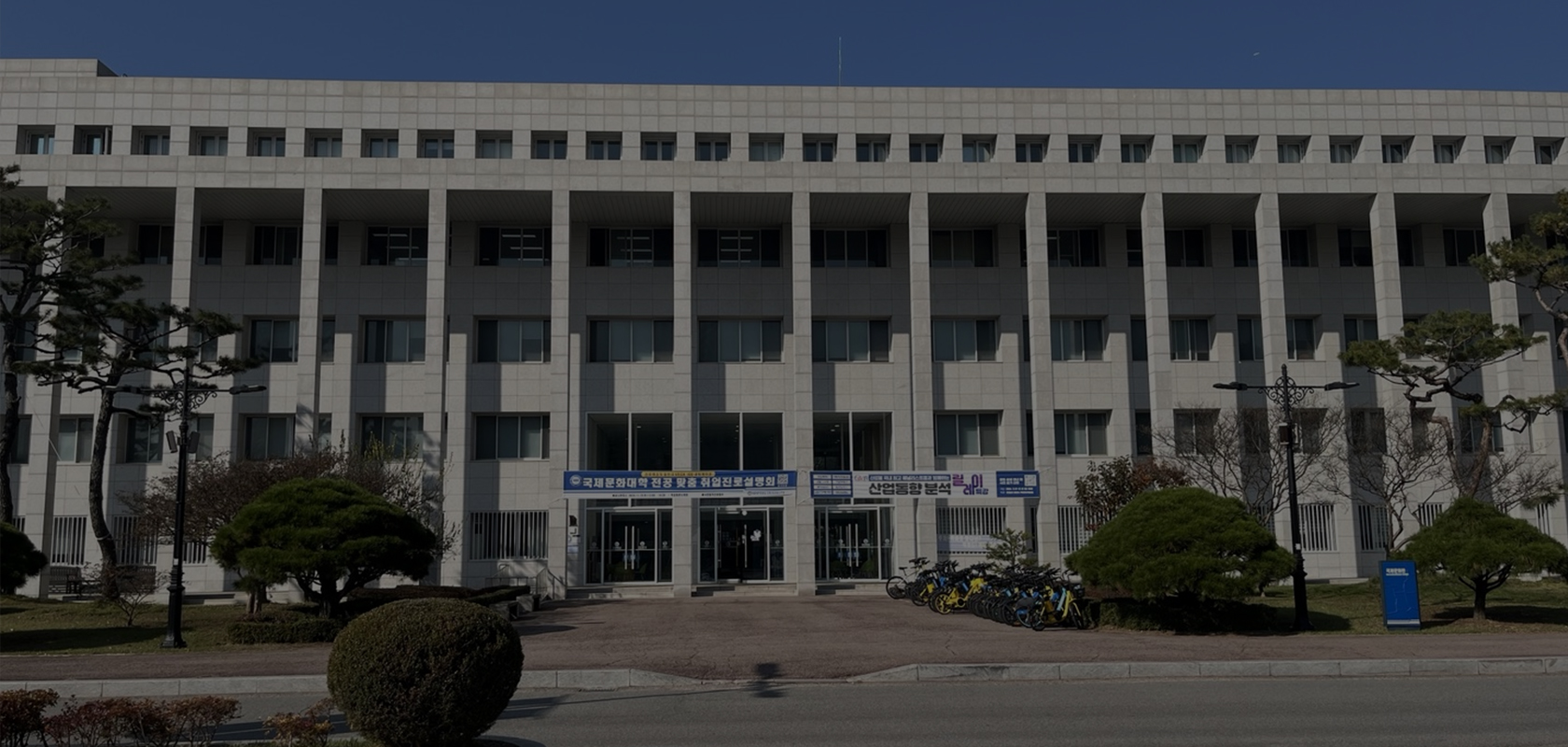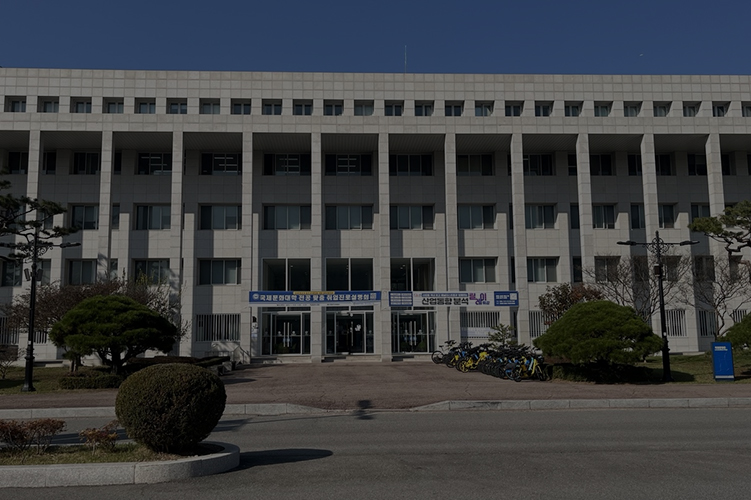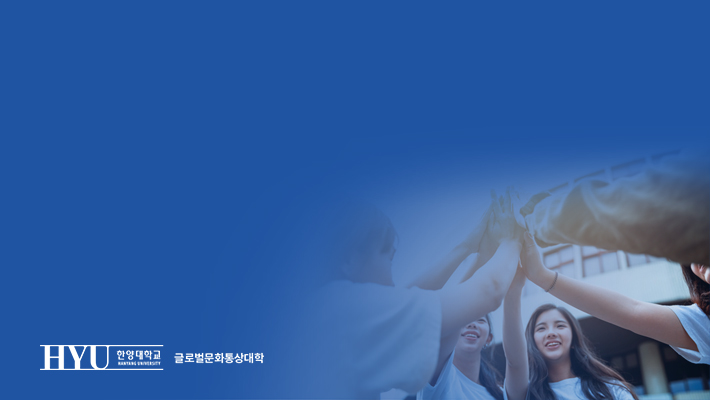

Department
-



- Department
- Department of Korean Language and Literature
Department of Korean Language and Literature



Thank you for visiting the
"Department of Korean Language and Literature,"
dreaming to be global leaders based on our literature and language.
Department
The Department of Korean Language and Literature aims to cultivate humanities experts with linguistic sensitivity and literary knowledge, creative talents who can apply Korean language and literature to practical fields, and global leaders who can introduce and spread Korean language, literature, and culture both domestically and internationally. To achieve this, our department focuses not only on learning the specialized contents of classical literature, modern literature, and linguistics but also on finding ways to apply language and literature practically. In the first and second years, the curriculum focuses on foundational and core courses to build a solid foundation in Korean literature and linguistics. In the third and fourth years, specialized courses are offered, with a focus on practical subjects that utilize the major. This structure helps students grow into competitive talents in the era of the Fourth Industrial Revolution. Recently, theory-based courses are also conducted through IC-PBL (Industry Coupled-Problem Based Learning), allowing students to not only master theoretical knowledge but also learn how to practically apply it, encouraging the application of classroom learning to real-world industry settings. Additionally, interdisciplinary and practical courses such as Data Humanities, Cultural Archetypes and Storytelling, Literature and Psychology, Media Literacy, Language Information Processing, Korean Language Education for Foreigners, Korean Culture Education for Foreigners, Publishing Planning, and Drama Writing are offered to enhance the competitiveness of the major. After graduation, students can pursue careers in Education, including professors, secondary school teachers, Korean language teachers for foreigners, or psychological counselors after completing graduate studies. Graduates can also work as reporters and producers at newspapers and broadcasters, broadcast writers, web novel writers, or in publishing, education consulting, corporate PR teams, and more, showcasing their capabilities. We hope you enjoy studying at the Department of Korean Language and Literature and design a happy future.
Educational Goal and Specialization Strategy
-Educational Goal : The Department of Korean Language and Literature has as its primary goal the fostering of highly competent talent who can serve as experts in Korean studies. These future professionals will be able to readily adapt to each any related field of the humanities and social sciences and as a result, be able to precisely learn and then teach the Korean language as well as Korean literature to those interested. In addition, the program aims to cultivate professionals who are prepared for and can readily adapt within the era of 4th Industrial Revolution. With th education and research skills gained from the program, our graduates will play active roles in the globalization of the Korean language and literature.
-Specialization : Cultivating competent, educated professionals to be outstanding global contributors
| Departmental Specialization Strategy | ||
|---|---|---|
| Character-building education and counseling system involving faculty and student mentoring | Reinforcing the goal of the department to achieve global recognition | Specialized Extra Curricular Program |
|
Advisor assignment upon admission
|
Strengthening connectivity of classes and related fields through IC-PBL teaching methodology
|
Academic field trips and cultural trips with professors and students are offered each semester (to analyze and record local language and folklore data, and/or develop local cultural contents: trip reports are placed in each library and developed cultural contents are submitted to a contest)
|
Department History
1983
- Establishment of the Department of Korean Language and Literature
1987
- First graduates from the Department of Korean Language and Literature
1997
- Changed to the Department of Korean Language and Literature in the School of Humanities
- Ranked 9th among 45 departments of Korean Language and Literature nationwide in the JoonAng University Comprehensive Evaluation(Faculty and Educational Environment Criteria)
2005
- Awarded for excellence in the academic evaluation field of Korean literature by the Korean Council for University Educators(Ranked 2nd)
2008
- Reorganized as the Department of Korean Language and Literature
Student Societies
- SiPae (Poetry Society) : Student group studying theory and literary criticism for poetry writing
- Ice Rainbow (Singing Society) : Student group studying classical poetry, the roots of modern songs, and performing in a choir
- PhotoInjung (Photography Society) : Student group studying photography and visual literature
- Gahee (Korean Percussion Society) : Student group performing Korean traditional percussion music
Careers after Graduation
The Department of Korean Language and Literature covers the foundation of the Korean language, culture, and literature, and thus there are a variety of career options available to graduates. Careers vary from teaching Korean literature and writing and Korean language, as well as other areas such as editing, publishing, cultural planning, working in media including newspapers, broadcasting, magazines, the advertisement field, writing for scripts, screenwriting, and so on. Many of the department alumni have found employment as reporters, copywriters, broadcast writers, and writing for news outlets, advertising agencies, corporate PR offices, magazines, and publishers. In addition, full-time professors of this department are recognized national poets, novelists, and literary and cultural critics who provide direct assistance to students who seek to engage in literary and cultural creation.
Other Related Pages
- Korean Culture Center : https://hkli.hanyang.ac.kr/





















